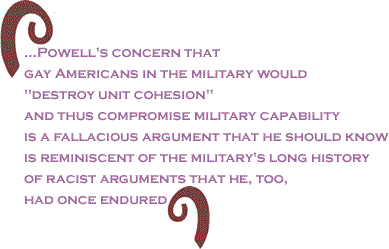
|
|||||||||||||||||||||
 |
|||||||||||||||||||||
 |
|
|
While it is not surprising that Marine Gen. Peter Pace gave his personal opinion about gay service men, stating that homosexuality is “immoral", it is surprising, however, that in the midst of a war that needs every able body that wants to fight, the enlisting of our American patriots continues to include a debate about sexual orientation. Military readiness is not a heterosexual calling. And even Charles Moskos, the chief architect of "Don't Ask, Don't Tell", has said that the policy should be temporarily suspended, especially if the draft is reinstated. The policy polices the sexual behavior of its service members because grounds for their discharge include “...if they attempt to engage in a ‘homosexual act’, state they are gay openly (unless they can prove they have no propensity or intention to engage in a ‘homosexual act’) or attempt to marry a person of the same sex". The military's belief that service members who are gay and lesbian endanger "unit cohesion" only maintains a policy of segregation and fosters a climate of intolerance. Also, the beliefs that men of mixed sexual orientations showering together and heterosexual women sitting on the same toilet seats as lesbians corrupt the military's image are eerily reminiscent of the same argument used when the military was forced to racially integrate its ranks. But Pace isn’t the only who feels that gays should not serve in the military. In a 2003 interview with online news site TeenInk.com, former Secretary of State Colin Powell shared his reason for defending the military's ban on gay service members: "I think it's a different matter with respect to the military, because you're essentially told who you're going to live with, who you're going to sleep next to." The Rev. Peter J. Gomes, Pusey Minister in the Memorial Church at Harvard University, wrote in his essay, "Black Christians and Homosexuality: The Pathology of a Permitted Prejudice", that Powell's concern that gay Americans in the military would "destroy unit cohesion" and thus compromise military capability is a fallacious argument that he should know is reminiscent of the military's long history of racist arguments that he, too, had once endured. Unit cohesion and military capability Gomes stated "remains an appropriate concern of a military man, but General Powell in this dispute was more than a mere military man. He was a military man of color, and thus could give cover to any painful analogy between the admission of gays into a heterosexual military and the admission of blacks into a white military."
Homophobia, like racism and sexism, in our armed forces is militarily dangerous because it thwarts the necessary emotional bonding needed amongst service members in battle, and it underutilizes the needed human resources to make a strong and democratic military. The privacy rationale is another argument that advocates for the banning of gay service members in combat. This argument states that all service members have the right to maintain at least partial control over the exposure of their bodies and intimate bodily functions. In other words, heterosexual men deserve the right to control who sees their naked bodies. According to the privacy rationale argument, the “homosexual gaze” in same sex nudity does more than disrupt unit cohesion. It supposedly predatory nature expresses sexual yearning and desire for unwilling subjects that not only violate the civil rights of heterosexuals, but also cause untoward psychological and emotional trauma. While it is believed that the “homosexual gaze” would be the root cause for the disruption of unit cohesion and military capability of our service members, it is actually the macho male heterosexual culture embedded in this milieu. It is this culture that both sexually harass and rape female and gay service members. The study titled “ A Modest Proposal: Privacy as a Flawed Rationale for the Exclusion of Gays and Lesbians from the U.S. Military,” states that banning gay and lesbian service members would not preserve the privacy of its heterosexual service members, but would instead actually undermine heterosexual privacy because of its systematic invasion to maintain it. And in order to maintain heterosexual privacy, military inspectors would not only inquire about the sexual behaviors of its service members, but would also inquire into the sexual behaviors of the spouses, partners, friends and relatives of its service members. According to the study this is its findings: heterosexuals already shower with known gay service members, lifting the ban would not significantly increase the number of open gay service members, and few heterosexuals are extremely uncomfortable with gay service members. However, gays in the military were not always forcefully closeted with a “Don’t Ask, Don’t Tell” policy. Like heterosexual service members, lesbian, gay, bisexual and transgender service members have been proudly and openly putting their lives on the line for their countries since antiquity. The Greeks, for one, favored gay and bisexual young men in their military; since gay and bisexual men were considered a family unit, the Greeks knew that paired male lovers assigned to the same battalions were a military asset. They would fights courageously, side by side, and would die heroically together in battle. Alexander the Great (356-323 BCE), king of Macedonia and noted as one of the greatest military conquerors, was openly bisexual. When his lover Hephaestion died in battle, Alexander not only mourned openly for his lover, but he staged an extravagant funeral that took six months to prepare.
Military drag was a common practice in war during the first century. Heterosexual and queer men were known to cross-dress as women in order to catch their opponents off-guard. First-century historian Josephus wrote in his "History of the Jewish War," "While their faces looked like the faces of women, they killed with manly right hands." Our most well known queers in the military, however, are Jonathan and David in the Old Testament. In Samuel 18:1-3, Jonathan makes a covenant with David and strips off his clothes in front of David to give him his armor. In Samuel 20:41, Jonathan and David kiss each other. When Jonathan dies in battle, David conveys his love for Jonathan when he says, in 2 Samuel 1:26: "I grieve for you, Jonathan my brother! Most dear have you been to me; your love more wonderful to me surpassing the love of women." Our gay and lesbian service members are prepared to defend this country with their lives. And an absence of openly gay and lesbian service members shows how America will not be able to present itself as a united front on the battle field because the real war in America is with itself. BC columnist, the Rev. Irene Monroe is a religion columnist, public theologian, and speaker. She is a Ford Fellow and doctoral candidate at Harvard Divinity School. As an African American feminist theologian, she speaks for a sector of society that is frequently invisible. Her website is www.irenemonroe.com. Click here to contact the Rev. Monroe. |
|
| Home | |
| March
22, 2007 Issue 222 |
||||||||||||||
|
||||||||||||||
| Printer Friendly Version in resizeable plain text format | ||||||||||||||
 |
||||||||||||||
|
||||||||||||||
 |
||||||||||||||
 |
||||||||||||||
 |
||||||||||||||
| |
||||||||||||||
| |
||||||||||||||































